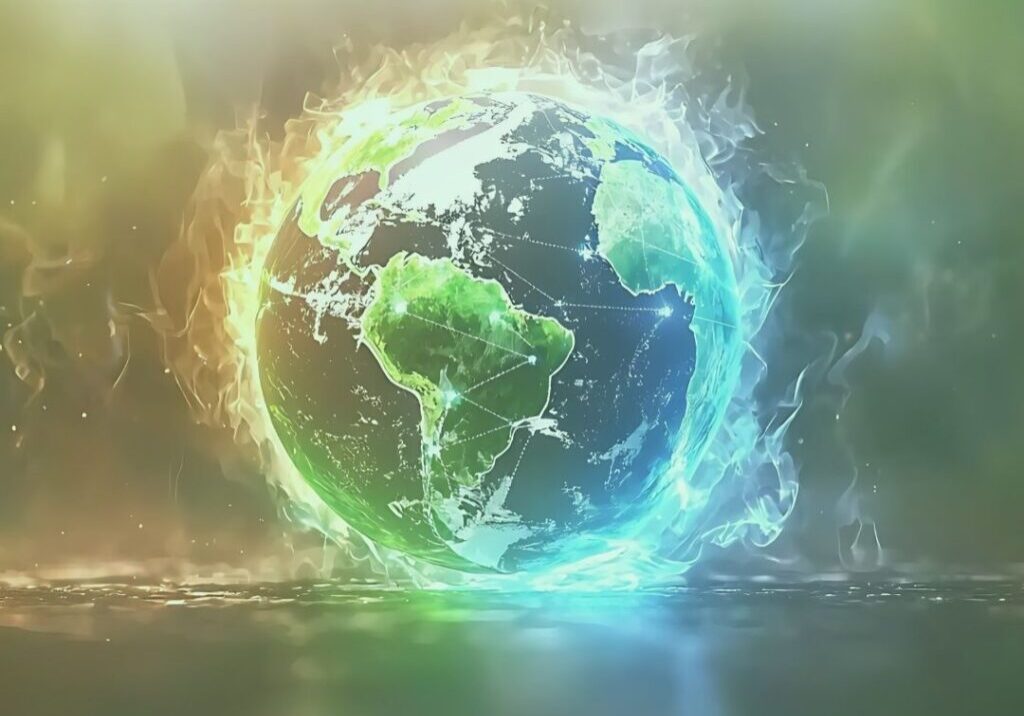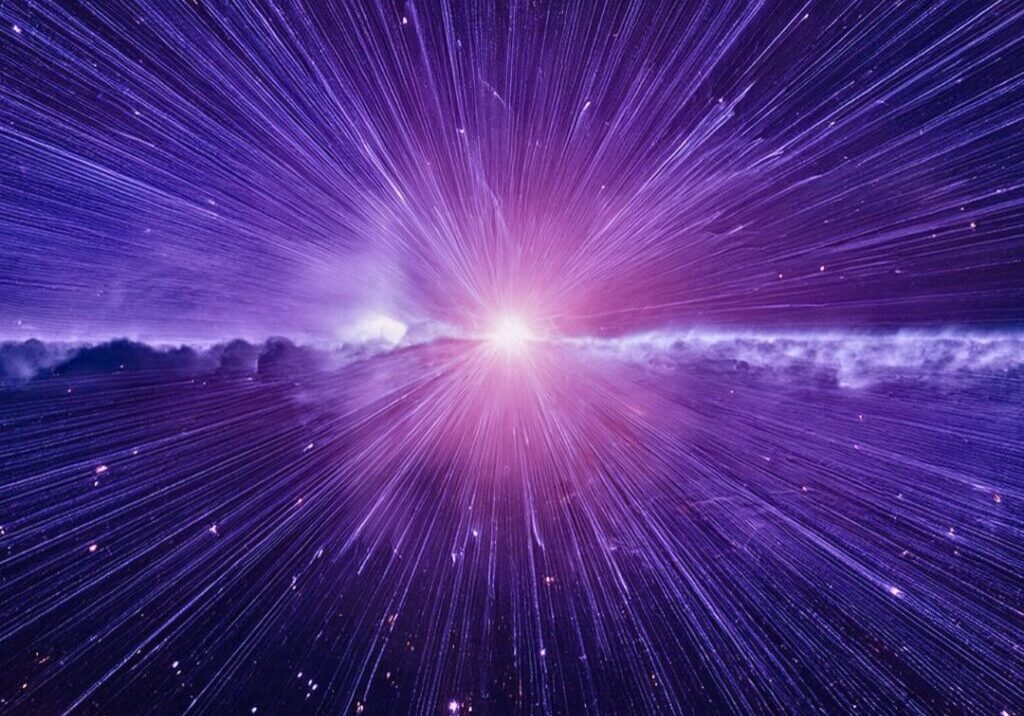Hope for the Future
 Dear Friends,
Dear Friends,
As I wind down another semester of teaching, I cannot help but reflect on the potential of Teilhard’s vision for healing our world today. I had the opportunity this semester to teach an undergraduate course called “Christ in a Scientific Age,” in which the latter half of the course was devoted to Teilhard’s ideas on faith and evolution. I cannot begin to tell you how deeply inspired I was by the openness of the students to new ideas on religion and evolution. Most of them were self-identified as “spiritual but not religious” and one student identified himself as “atheist”; yet, by the end of the course, even the atheist was yielding to the need for a new religious paradigm. One freshman student wrote:
“These dichotomies between the rational and the mystical, the matters of science and faith, a fractured society and a unified humanity, were all topics Teilhard believed could be unified with love and an openness to the spirit. To embrace evolution is not to shun religion; to embrace evolution is to rely even more on religion, as the next step in evolutionary consciousness can only come about by being pulled closer to God.”
Such insight leads me to believe that younger generations have not ditched religion but are ardently searching for a new vitality of religion, where God is at home in a world of change and complexity.
Teilhard thought that religion itself is not a problem; rather, he said, we have an “unsatisfied theism,” a type of religious pablum that no longer fills the hungers of the human heart. The monotheistic faiths are enervated and provide little more than personal comfort and security. They cling to old cosmologies and ancient philosophies that cannot adequately speak to a world in evolution. Traditional religious language falls on deaf ears because it is unintelligible. What is not understood by the mind is irrelevant to the heart. There is every reason to enkindle religion in a way that brings vitality to life for all, especially for younger generations who are seeking to build a new world.
Teilhard’s vision of religion and evolution is a vision of hope because it begins with a positive value of science and technology; it is a religious vision that embraces cosmic and biological evolution, recognizing that change is part of life and God is at home in change. Most of all, it is a vision grounded in the energy of love. Despite the forces of entropy and breakdown, Teilhard states, we have the capacity for a unified planet because love is the physical structure of the universe.
For their final exam, my students had a choice of four out of six essays to write. The final question was on Teilhard’s position on love. There was unanimous agreement that love is the key to the future of the earth’s planetization. The students recognized that technology can link our minds together, providing a collective awareness of the problems we face, but it is love that energizes us to work together for the good of the whole. One student commented on love in terms of the “zest for life.” He wrote: “This ‘zest for life is the will to live and love life. . .an indispensable requisite for the continuity of love. . .and also for the development of a planetary ethic. To have a zest for life is to have a love for life, and to have a love for life is to have a love for the activities you are involved in and a love for the people around you.” He went on to say, “our entire search for truth and meaning in the universe must be fueled by our love for the universe and our love for each other.”
This young student will soon be an engineer, helping to build tomorrow’s world. Another student, who matriculated in the course from Wuhan China, quoted Albert Einstein’s letter to his daughter in which he spoke of love as the core energy of the universe. Einstein wrote:
“To give visibility to love, I made a simple substitution in my most famous equation. If instead of E=mc2 we accept that the energy to heal the world can be obtained through love multiplied by the speed of light squared, we arrive at the conclusion that love is the most powerful force there is, because it has no limits.”
This sounds very much like Teilhard who said that “love is the most powerful and still the most unknown energy in the world.”
What I want to convey here is that young men and women are struggling for meaning in a world divided by race, religion and gender; yet, they are open to the work of God’s Spirit. Teilhard gives them reason to hope, to believe in God as the power of the future, and to nurture love as the unifying energy of planetary life. Love is ubiquitous; love knows no skin color or gender or language or religion. Love speaks from heart to heart and transcends all political, religious, cultural and ethnic divides. Love spelled backwards is the prefix of evolution. Love, Teilhard thought, can bring us to the threshold of another universe.
Our June fundraiser this year is focused on giving the next generation reasons to hope in the goodness of God and the binding power of love. In a world filled with deep hurt, anger, illness and sadness, hope is fragile and hovers over the abyss of doubt and despair. Teilhard formed his vision amidst the fallout of two world wars; he wrote in exile from his homeland, suffered the loss of family members and was constantly misunderstood. Yet his writings convey insuperable hope; this unfinished universe is seeking its completion up ahead, and we humans are to be co-creators in this unfinished process of life, kindling the energy of love. This is a religious vision for a world in evolution; when it is shared with younger and older generations it fills them with hope and confidence that their lives have meaning, that their efforts can contribute to a world seeking its future fullness. The term “Christogenesis” refers to the unfinished work of God, the reality that the Word of God is still being born in us. However, we must wake up to this dynamic reality of God in our lives if the world is to unify in love. The “Center for Christogenesis” may be an online forum but the real Christogenic center is each person: the center is you!
Our work at C4C is to deepen Teilhard’s vision, translate it for the world in which we find ourselves today, and broaden its potential through workshops, webinars, conferences and collaboration. We seek to offer a new vision of religion, a religion of the earth for a world in evolution. To realize these goals, we need your support. As our staff grows and our membership widens, so too do our needs for more personnel, updated technology and the ability to reach an international community. We hope you will support us, for God is seeking to make all things new!
Peace,
Sr. Ilia
+
You can support the work of the Center for Christogenesis here.
Thank you!
 View print-friendly version
View print-friendly version
3 Comments
Related Posts

The Earth Groans, AI Grows: Who Guides the Flame?
In this critical moment of planetary history, where ecosystems collapse, artificial intelligence proliferates, and human meaning trembles on the edge of uncertainty, we are faced with a profound question: What kind…


Your voice is invaluable. In these times (so anxious, angry and divided, as you point out) we are very, very fortunate to have you teaching the younger generations. Reading the splendid and profound reflections of your students is uplifting and gives me some hope for the future.
Dear Sr Ilia, Touched by your earnest appeal, and praying like you for an expanded public consciousness which, like Bede Griffiths, Matthew Fox, Richard Rohr and others extends Christianity to Krishtianity. As a PhD candidate at London University Inst of Ed, under the ‘super vision of bio-ethicist, priest, philosopher of Science Michael Reiss, I baulked at the expectation that I needed to be ‘original’ until I realised this simply meant going back as far as possible to origins of the particular concepts one was trying to fathom. Finally, an Unconditional Pass, and two Linguistic Anthropology Routledge publications later, I thank God for guidance, guarding, go(o)ds collected in 45+ countries, and see that even ‘failures’ e.g. my not being able to have children, NO thing can separate us from Hegelian Absolute Spirit, transcendent, immanent, evolving zeit geist at work in saints like Teilhard. Look after yourself, and go easy metaphysically and physically (on your bike!)
In reality, there are not two stories, a creation story and an evolution story. There is only one story spoken of from two non-integrated perspectives, one classified as science, the other categorized as spirituality, each generated from a mind that perceives and thinks dualistically (separation-consciousness). Both are universal mortal beliefs that fall short of seeing in wholes. The key lies in wholeness. In the original languages the word “whole” comes from the same root word as the words “heal” and “holy.” Thus, a whole person is both healed and holy in the literal sense, healed of the splits and divisions in perception, thought and the capacity to give and receive love. The basis of any whole-making thrust lies in achieving the conscious realization of oneness and omnipresence. Such is not mental, but beyond the mental. The mental is meant to serve only as an avenue of that spiritual awareness. Wholeness and spirituality are all about seeing, said Teilhard. John Ruskin said it best, “The greatest thing a human soul ever does in this world is to see something and tell what it saw in a plain way. Hundreds can talk for one who can think, but thousands can think for one who can see. To see clearly is poetry, prophecy and religion all in one.” There’s a great difference, therefore, between knowledge and knowing, religion and spirituality, ordinary perception and real seeing. As big a difference as between a teacher and a Master. The former teaches “about” the deeper realities, while the latter awakens you to them. Once awakened, not only can one see clearly, but can love properly from that awakened state where all things share common ground in the light and love of the infinite invisible.